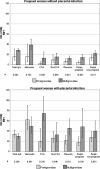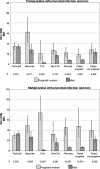Parity and placental infection affect antibody responses against Plasmodium falciparum during pregnancy
- PMID: 21300778
- PMCID: PMC3067565
- DOI: 10.1128/IAI.01000-10
Parity and placental infection affect antibody responses against Plasmodium falciparum during pregnancy
Abstract
Women are at higher risk of Plasmodium falciparum infection when pregnant. The decreasing risk of malaria with subsequent pregnancies is attributed to parity-dependent acquisition of antibodies against placental parasites expressing variant surface antigens, VAR2CSA, that mediate placental sequestration through adhesion to chondroitin sulfate A (CSA). However, modulation of immunity during pregnancy may also contribute to increase the risk of malaria. We compared antibody responses among 30 Mozambican primigravidae and 60 multigravidae at delivery, 40 men, and 40 children. IgG levels were measured against the surface antigens of erythrocytes infected with P. falciparum isolated from 12 pregnant women (4 placental and 8 peripheral blood isolates) and 26 nonpregnant hosts. We also measured IgG levels against merozoite recombinant antigens and total IgG. Placental P. falciparum infection was associated with increased levels of total IgG as well as IgG levels against merozoite antigens and parasite isolates from pregnant and nonpregnant hosts. We therefore stratified comparisons of antibody levels by placental infection. Compared to multigravidae, uninfected primigravidae had lower total IgG as well as lower levels of IgGs against peripheral blood isolates from both pregnant and nonpregnant hosts. These differences were not explained by use of bed nets, season at delivery, neighborhood of residence, or age. Compared to men, infected primigravidae had higher levels of IgGs against isolates from pregnant women and CSA-binding lines but not against other isolates, supporting the concept of a pregnancy-specific development of immunity to these parasite variants. Results of this study show that parity and placental infection can modulate immune responses during pregnancy against malaria parasites.
Figures




Similar articles
-
Designing a VAR2CSA-based vaccine to prevent placental malaria.Vaccine. 2015 Dec 22;33(52):7483-8. doi: 10.1016/j.vaccine.2015.10.011. Epub 2015 Nov 26. Vaccine. 2015. PMID: 26469717 Free PMC article. Review.
-
Analysis of IgG with specificity for variant surface antigens expressed by placental Plasmodium falciparum isolates.Malar J. 2004 Jul 8;3:21. doi: 10.1186/1475-2875-3-21. Malar J. 2004. PMID: 15242514 Free PMC article.
-
Plasma antibodies from malaria-exposed pregnant women recognize variant surface antigens on Plasmodium falciparum-infected erythrocytes in a parity-dependent manner and block parasite adhesion to chondroitin sulfate A.J Immunol. 2000 Sep 15;165(6):3309-16. doi: 10.4049/jimmunol.165.6.3309. J Immunol. 2000. PMID: 10975848
-
Functional Antibodies against Placental Malaria Parasites Are Variant Dependent and Differ by Geographic Region.Infect Immun. 2019 Jun 20;87(7):e00865-18. doi: 10.1128/IAI.00865-18. Print 2019 Jul. Infect Immun. 2019. PMID: 30988054 Free PMC article.
-
VAR2CSA-Mediated Host Defense Evasion of Plasmodium falciparum Infected Erythrocytes in Placental Malaria.Front Immunol. 2021 Feb 9;11:624126. doi: 10.3389/fimmu.2020.624126. eCollection 2020. Front Immunol. 2021. PMID: 33633743 Free PMC article. Review.
Cited by
-
Multiplexing detection of IgG against Plasmodium falciparum pregnancy-specific antigens.PLoS One. 2017 Jul 17;12(7):e0181150. doi: 10.1371/journal.pone.0181150. eCollection 2017. PLoS One. 2017. PMID: 28715465 Free PMC article.
-
Designing a VAR2CSA-based vaccine to prevent placental malaria.Vaccine. 2015 Dec 22;33(52):7483-8. doi: 10.1016/j.vaccine.2015.10.011. Epub 2015 Nov 26. Vaccine. 2015. PMID: 26469717 Free PMC article. Review.
-
Low antibodies against Plasmodium falciparum and imbalanced pro-inflammatory cytokines are associated with severe malaria in Mozambican children: a case-control study.Malar J. 2012 May 30;11:181. doi: 10.1186/1475-2875-11-181. Malar J. 2012. PMID: 22646809 Free PMC article.
-
Hyperparasitaemia during clinical malaria episodes in infants aged 0-24 months and its association with in utero exposure to Plasmodium falciparum.BMC Res Notes. 2018 Apr 4;11(1):232. doi: 10.1186/s13104-018-3339-0. BMC Res Notes. 2018. PMID: 29618382 Free PMC article.
-
Relationships between infection with Plasmodium falciparum during pregnancy, measures of placental malaria, and adverse birth outcomes.Malar J. 2017 Oct 5;16(1):400. doi: 10.1186/s12936-017-2040-4. Malar J. 2017. PMID: 28982374 Free PMC article.
References
-
- Alonso, P., et al. 2001. Manhica DSS, Mozambique. Popul. Health Dev. Ctries. 1:189-195.
-
- Alonso, P. L., et al. 2004. Efficacy of the RTS,S/AS02A vaccine against Plasmodium falciparum infection and disease in young African children: randomised controlled trial. Lancet 364:1411-1420. - PubMed
-
- Avelino, M. M., D. Campos, Jr., J. do Carmo Barbosa de Parada, and A. M. de Castro. 2003. Pregnancy as a risk factor for acute toxoplasmosis seroconversion. Eur. J. Obstet. Gynecol. Reprod. Biol. 108:19-24. - PubMed
-
- Banic, D. M., F. S. Viana-Martins, J. M. De Souza, T. D. Peixoto, and C. Daniel-Ribeiro. 1991. Polyclonal B-lymphocyte stimulation in human malaria and its association with ongoing parasitemia. Am. J. Trop. Med. Hyg. 44:571-577. - PubMed
-
- Barbee, R. A., M. J. Hicks, D. Grosso, and C. Sandel. 1991. The maternal immune response in coccidioidomycosis. Is pregnancy a risk factor for serious infection? Chest 100:709-715. - PubMed
Publication types
MeSH terms
Substances
LinkOut - more resources
Full Text Sources
Medical

